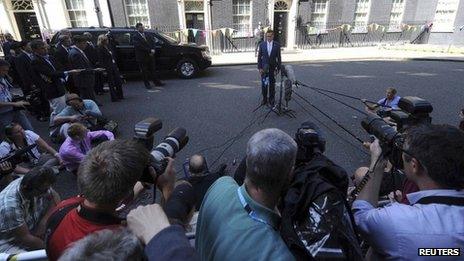Mitt Romney's Olympic mishap
- Published
- comments

I have watched many a man and woman stand before that famous door in Downing Street.
They excuse themselves, justify their words or actions, explaining what they've said, or what they've done with varying degrees of passion and conviction.
Politicians must get used to feeling like they are perpetually on trial.
The jury is still out on Mitt Romney. He looked stiff, as he always does, and slightly nervous, which he sometimes does. But he was brisk in rowing back from his offence, if such it was.
But the message beamed back home to American voters was not the one he wanted.
Olympic past
Mr Romney is something of an expert on things going wrong in the Olympics, as the saviour of the Salt Lake City winter games in 2002, which appeared to be heading for disaster before he stepped in.
So it was natural that when he was interviewed by NBC, Brian Williams asked him about London's readiness.
"There were a few things that were disconcerting," he said, not least the row about security and a possible border control strike.
"It's hard to know just how well it will turn out."
Is this a gaffe? It is certainly a story.
I worry about accusing politicians of making gaffes when they've uttered remarks that would be regarded as plain common sense if anyone else had said them.
We in the media risk forcing them to tame all their opinions until they are so bland as to be dishonest.
Nevertheless, Mr Romney was less diplomatic than might have been expected. It became front page news in the British newspapers (and I reported on it from the BBC's One O' Clock news onwards).
It was even better when Mr Cameron appeared to respond in kind with a slight on Salt Lake City by saying "of course it is easier if you hold an Olympic Games in the middle of nowhere".
A row! A story!
Rowing back
So when Mr Romney appeared in front of the door of Number 10 all the American press wanted to ask about was how he had apparently offended, if not his hosts, the "London press".
He manfully rowed back. A bit. He said it was impossible for absolutely no errors to occur and that he was "excited" and "applauded the work of the organisers".
He said that any errors would be overshadowed by the "courage, character and determination of the athletes" and the city would be "unified and uplifted" by the Games.
I said on the BBC's Today programme this morning that for politicians the foreign trip often turns out to be about The Trip.
It is remembered for what is defined as an undiplomatic mis-step rather than the pictures of moist and over-lengthy handshakes that they are convinced will be so appealing to viewers back home.
Mr Romney should know this. He has already had to damp down a fire started when an unidentified aide told the Daily Telegraph that they understood Britain better than the White House because of a shared "Anglo-Saxon" heritage.
Where's the story?
Waiting outside Downing Street, I was talking to American journalists, some of whom have been following Mitt Romney for about a year now.
"If only he would give us a story!" one of them exclaimed. He apparently rarely bothers, or tries.
At his most relaxed and likeable, he insists that everything he has said is off the record.
They are very frustrated.
This is the real point. An astute politician may despise the media but knows that the journalists who trail around behind him or her need to report something.
Mr Romney gives the impression of going into every interview and every situation, outside certain set-piece speeches, open-minded about which of his remarks will be reported.
It is quite endearing, even refreshing. But it means the message he wants to convey is in constant danger of being drowned out.
A big black suburban SUV lurked by the door of number 11 Downing Street as Mitt Romney spoke to the assembled press, ready to whisk him away when he had answered their last question about the Olympics.
If he ever returns here, Mr Romney will be in a convoy half-a-mile long and as the leader of the most powerful nation on earth. Maybe by then he will have worked out the story.